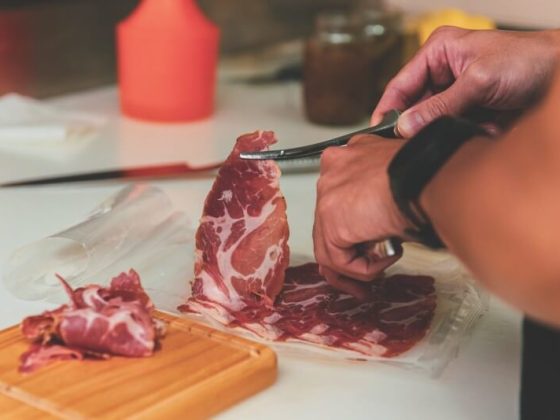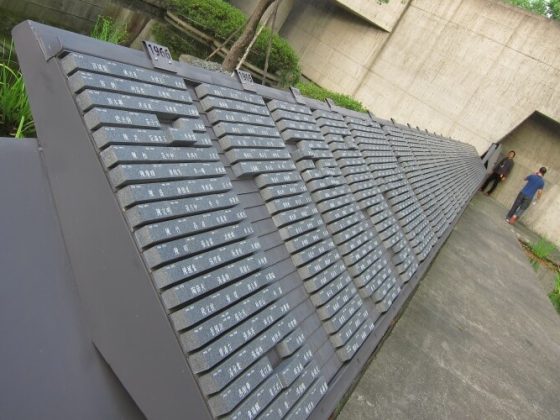Traveling is an easy task for most people, but for those with mobility issues, it may be an impossible mission. Having to overcome the inconvenience of moving about from one place to another, physically-challenged people often instead choose to stay at home most of the time. DuoFu Holidays (多扶假期), an enterprise which started as a barrier-free shuttle service, found that many of its physically-challenged customers actually needed more than just pick-up and drop-off: they also desired to travel with their family and friends. To realize these customers’ dreams, the CEO of DuoFu Holidays, Jeff Hsu (許佐夫), was determined to do his part to improve the friendly environment of society as a whole, and therefore developed his company into a travel agency serving the mobility challenged.
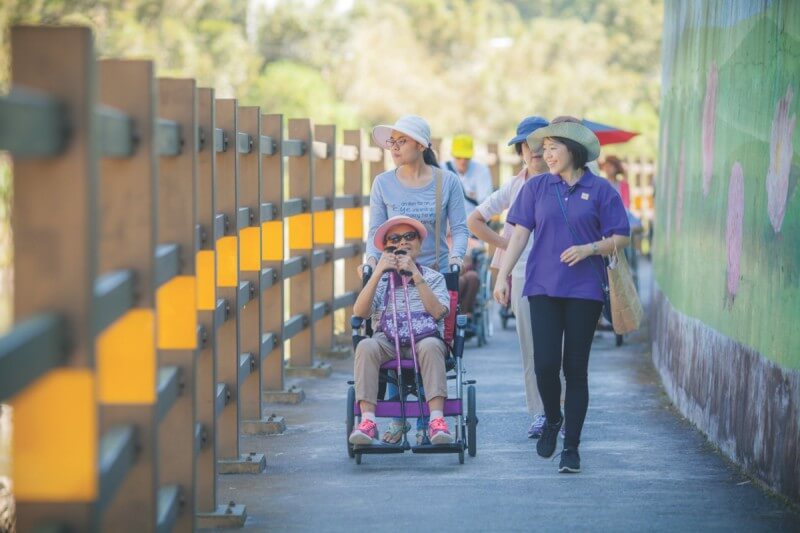
Breaking the Barriers
Hsu has assembled a team of like-minded altruistic associates at DuoFu Holidays, Taiwan’s first private travel firm dedicated to society’s mobility challenged. “In terms of ‘change,’” he says, “you could say we change night into day for our customers, bringing hope and freedom to people with mobility issues by opening up the travel world to them. Many, tentative about moving about in public and not wanting to be a burden to their family and/or caregivers, have effectively been shut-ins until taking advantage of our services, at best limited to their immediate neighborhoods.”
Hsu states that government specialty transport services generally only take people from home to the hospital, clinic, etc. In contrast, DuoFu provides both pre-designed and custom-designed trips around Taipei, Taiwan, and even abroad. Its fleet of varied-size transport vehicles is custom-built, “Each very spacious and accommodating wheelchairs, with headspace allowing people to fully stand up, with a heavy-duty wheelchair lift,” notes Hsu. “We also have a full range of equipment to meet customers’ widely varying individual needs, handling everything from picking you up at home to handling your requirements at every travel site visited, hotels, restaurants, etc.”
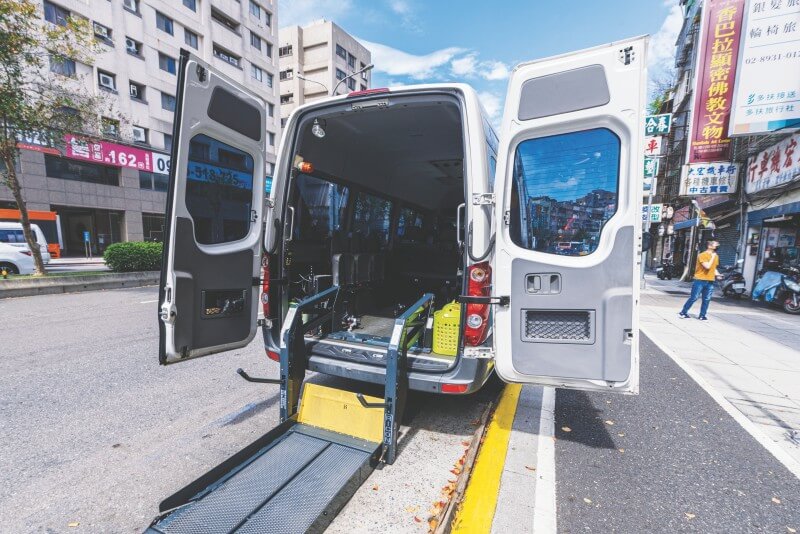
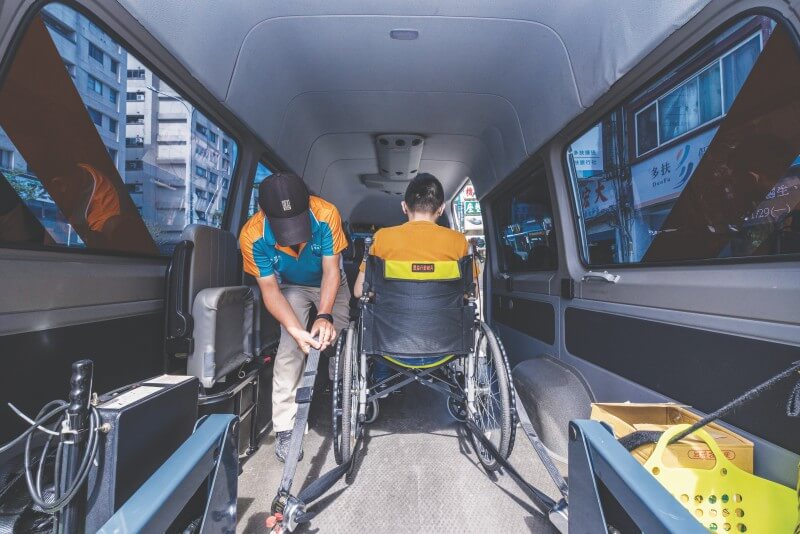
According to Hsu, DuoFu has developed specialized SOPs according to UN standards since all of its personnel are extensively trained, and it provides caregivers for all specialized situations. “Our personalized caregiver service — each mobility- challenged person has very different physical conditions — takes the burden off family caregivers, who are freed from handling the special situations,” he says.
Furthermore, this customized caregiver service also gives a sense of freedom and hope to family members. “Everyone starts looking forward to traveling as a family group again, bringing families closer together,” Hsu remarks proudly.
A Mission Conceived
The DuoFu journey began with an unfortunate family event. In 2008, Hsu’s grandmother had a fall, and was left confined to a wheelchair. “My family quickly learned that government-offered transport assistance was limited in scope, confined as said to hospital trips, etc. I bought a vehicle and fitted it out for optimal mobility. Soon I was offering transport services to others, and a new business was born. I decided to give up my career as a documentary filmmaker,” Hsu says.
The first business, still in operation, was Taiwan’s first private rehab bus service operator. Over the years, Hsu’s customers began enquiring if he could arrange pleasure trips for them, and the DuoFu Holidays dream was hatched. “We opened in 2016 as a fully licensed travel firm, requiring a significant investment. We vet every travel site we visit, which requires continuing investment, and we have worked with the management of many sites to enable us to add them to our list. And as part of their training, all of our personnel must put themselves in the position of our mobility-challenged clients, experiencing exactly what they experience. This, as you can imagine, gives rise to much more attentive and intuitive service,” he says, further noting that DuoFu has received “countless” complaints from their clients, but that all criticism is taken constructively, turned into fuel to drive their progress and perfection.
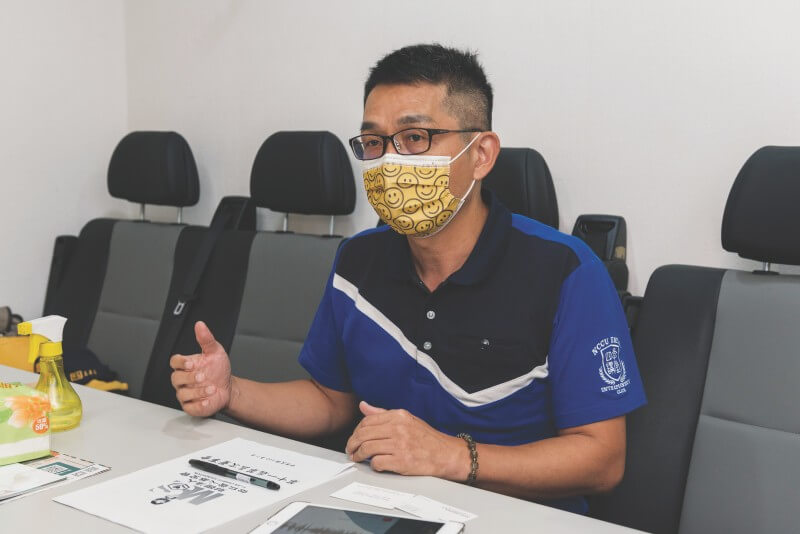
DuoFu Holidays has three primary customer segments: trips for seniors, for families with mobility-challenged members, and for organizations who have mobility- challenged staff members and/or employees with mobility-challenged family members coming along. “One-fifth of Taiwan families need the types of services we provide, and three to five percent of Taiwan companies have physically-challenged individuals on staff. Taiwan has one of the world’s fastest-aging societies, so there is great need for what we do,” Hsu says.
Easily Accessible Travel Spots in Taipei
Hsu states that the city of Taipei has made great progress in the past 10 to 20 years in terms of mobility access at major destinations, such as key tourist draws, hotels, and more. Mobility access is an intrinsic design element at comparatively young locations like the Taipei 101 Observatory, where there are braille elevators with a voice system as well as barrier-free bathrooms in the building, making visits relatively easy and pleasant for folks with mobility issues. On the other hand, in order to welcome visitors with different kinds of needs, the Taipei Astronomical Museum (台北市立天文科學教育館) has installed armrests, accessible ramps, and barrier-free seats for wheelchair users in its theater. Also, both places provide wheelchair rentals for visitors.
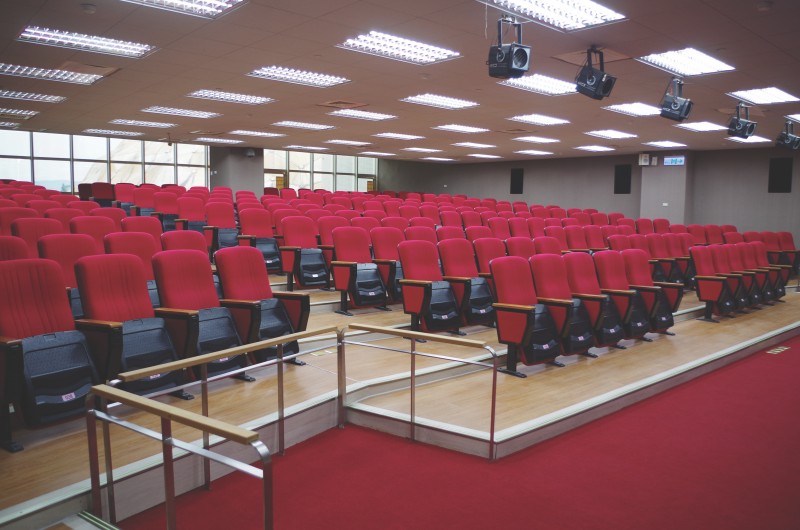
There are a number of other Taipei destinations and experiences, however, that Hsu feels are among DuoFu’s most special accomplishments and most valuable contributions to an inclusive Taipei/ Taiwan society.
One of them is the National Palace Museum (NPM, 國立故宮博物院). The grand NPM, in Taipei’s north, is home to the world’s greatest collection of Chinese imperial- era artworks and artifacts, and a Taiwan tourism icon. Hsu states that DuoFu has earned the NPM’s respect and established a solid relationship. The museum was already wheelchair-accessible, but DuoFu has helped make it aware that on any given day it receives visitors from 10-plus countries and that accessibility needs to extend much beyond wheelchair access. “Today, every NPM happening is designed with full awareness of the UN’s Convention on the Rights of Persons with Disabilities. For example, exhibits are now designed so that those who are sight-impaired can enjoy a fuller sensory experience. We’ve also helped them understand that folks in wheelchairs have very different sight lines, which can inhibit the viewing experience, and the NPM addresses these needs as well,” Hsu shares.
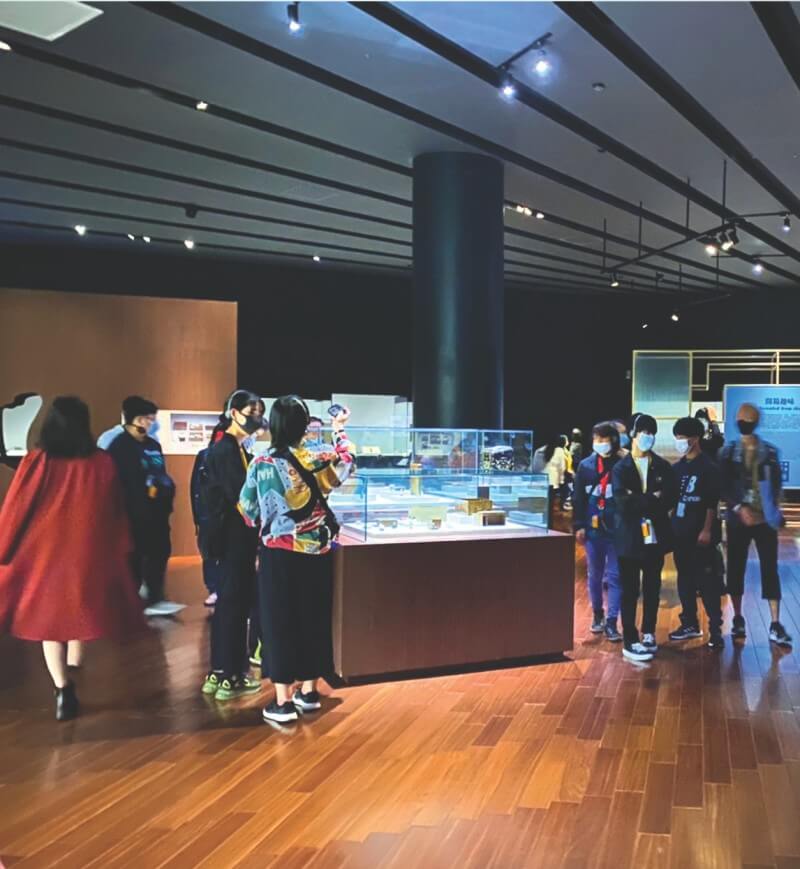
Taiwan is also a major hot-spring destination, and Taipei has a concentration of first-class facilities in the Beitou (北投) hot-spring resort area, in the city’s northwest at the foot of the Yangmingshan massif, as well as up on the crown of the massif in Yangmingshan National Park. DuoFu has developed unique SOPs for hot-spring bathing — as far as Hsu knows the first outfit to do so in East Asia, if not even further afield. “Our specially trained caregivers are right there at all times, getting bathers into the water and accompanying them. We were criticized heavily by many in the beginning, thinking we were putting mobility-impaired people in danger, but the buoyancy of the water is perfect, giving our clients maneuverability that would be impossible on land,” Hsu explains.
“Our clients have been deeply moved, experiencing a sense of freedom previously unimaginable to them. Some have informed us that they have not experienced the joy of a hot-spring outing for over 40 years,” Hsu goes on. Prior to the COVID-19 pandemic, DuoFu hosted customers from North America, Europe, and Japan, as they provided service in English and Japanese. “There is a solid component from Europe and Japan coming each winter specially for the hot-spring experience,” he adds.
According to Hsu, Songshan Cultural and Creative Park (松山文創園區), not far from Taipei 101, and the Yangmingshan American Military Housing complex (陽明山美軍宿舍群), up on Yangmingshan just outside the national park are both set up to facilitate maximum access for the mobility challenged.
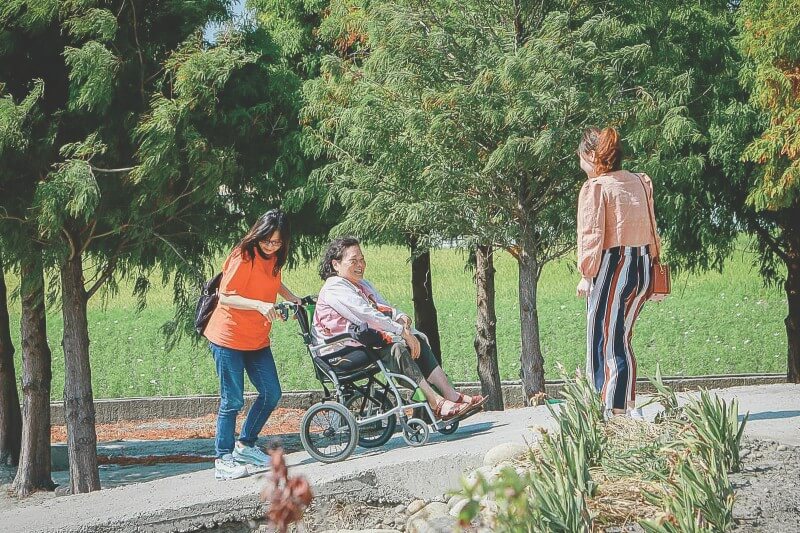
Songshan Cultural and Creative Park is a former tobacco factory complex, completed by the Japanese in 1937 during the colonial period, that has been transformed into an incubator for cultural-creative talent. The various heritage structures have been renovated, with several accessible installations such as wheelchair ramps and guides for the visually impaired, enabling visitors to explore the former warehouses freely. It also offers guided tours for individuals and groups with special needs to enable full access to the different exhibition buildings.
The Yangmingshan American Military Housing is another official heritage site, a sprawling former dormitory complex of over 100 ranch-style homes built in the 1950s for U.S. military officers, advisors, and their dependents. Today it is a quiet and exceedingly pleasant mountaintop getaway, with easy-navigation walkways that allow those in wheelchairs to explore without limitation. The residences have been renovated and fitted out with period furnishings, while adding extra facilities such as wheelchair accessible ramps and bathrooms. Brick Yard 33 1/3 (美軍俱樂部), the site’s integrated space combining a café, restaurant, and exhibition hall, is a totally flat place where people can move about freely with their assistive devices.
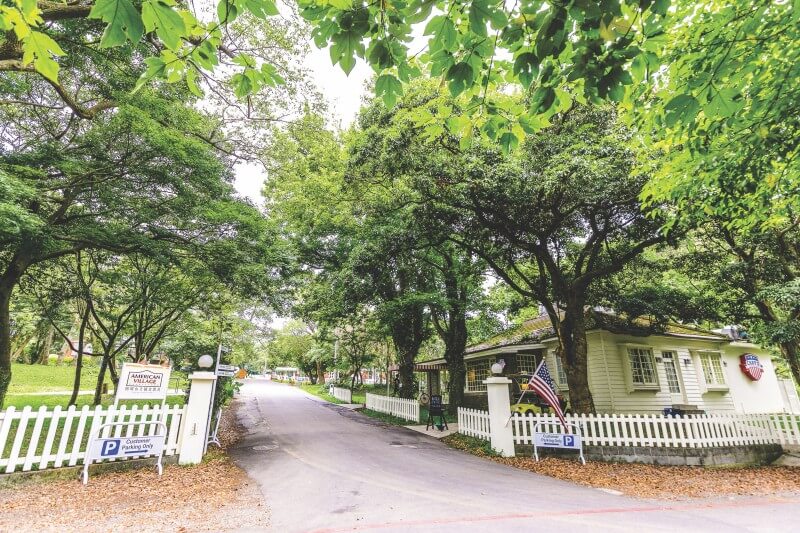
Rewards for a Difficult Mission Completed
“As you can imagine,” says Hsu, “we have chosen a very difficult mission for ourselves, with many obstacles presented. But there is no better reward than seeing a sense of hope and zest for living return to our clients, and know we played a role in that. To date, we’ve served over 140,000 travelers, and we’re very proud to report we’ve got a 97% satisfaction rate!”
The DuoFu goal is to work with as many people as possible, serving as a model and advisor, to continually raise the level of Taiwan’s obstacle-free services and environment, an aim they are working towards day in and day out.
Author Rick Charette
Photographer Samil Kuo, DuoFu Holidays, Taiwan Scene, Taipei Astronomical Museum
This article is reproduced under the permission of TAIPEI. Original content can be found on the website of Taipei Travel Net (www.travel.taipei/en).


